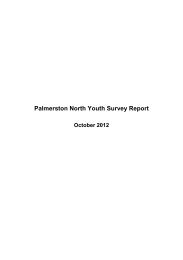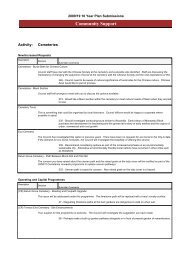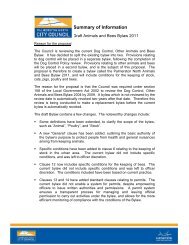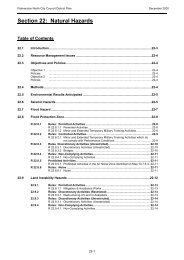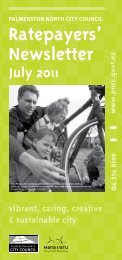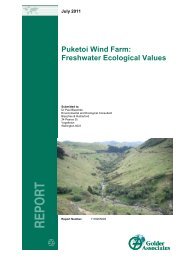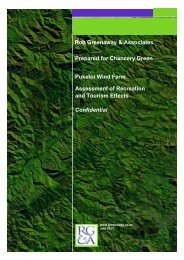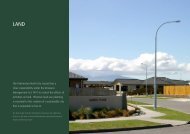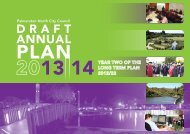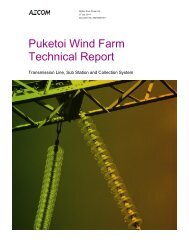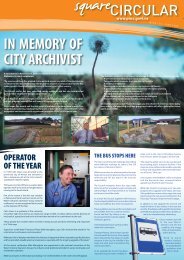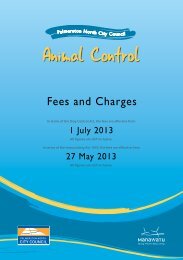Part 1 - Palmerston North City Council
Part 1 - Palmerston North City Council
Part 1 - Palmerston North City Council
You also want an ePaper? Increase the reach of your titles
YUMPU automatically turns print PDFs into web optimized ePapers that Google loves.
gemconsulting<br />
8 RESOURCE MANAGEMENT ACT - PART II<br />
Section 6 of the Act requires that all persons exercising functions and powers under the Act shall recognise<br />
and provide for the matters of national importance listed within the section. The following are considered<br />
to be of relevance to the proposed activities:<br />
(a)<br />
(d)<br />
(e)<br />
the preservation of the natural character of the coastal environment (including the coastal<br />
marine area), wetlands, and lakes and rivers and their margins, and the protection of them from<br />
inappropriate subdivision, use, and development;<br />
the maintenance and enhancement of public access to and along the coastal marine area, lakes<br />
and rivers;<br />
the relationship of Maori and their culture and traditions with their ancestral lands, water, sites,<br />
waahi tapu and other taonga;<br />
These matters have been discussed above in this report. It is considered that while there are elements of<br />
natural character at the site this character is compromised by the poor quality of vegetation in the area and<br />
by the urban activities above the cliff. It is also considered that, given the circumstances, the development<br />
is not an inappropriate development for the site. The proposal will provide for the establishment of future<br />
public access to the left bank of the river which would otherwise not be possible due to the nature of the<br />
cliff. As discussed above, Te Motu o Poutoa is located just down steam of the subject site. An accidental<br />
discovery protocol has been developed to address any discovery of archaeological material.<br />
Section 7 requires all persons exercising functions and powers under the Act to have particular regard to<br />
certain matters. The following are of relevance to this proposal:<br />
(a)<br />
(b)<br />
(c)<br />
(f)<br />
(i)<br />
Kaitiakitanga<br />
the efficient use and development of natural and physical resources;<br />
the maintenance and enhancement of amenity values;<br />
maintenance and enhancement of the quality of the environment<br />
the protection of the habitat of trout and salmon<br />
The proposal represents the efficient use and development of natural and physical resources. The works<br />
provide for the protection of the residential land resources above the cliff and the continued protection of<br />
that land on the right bank of the river. This will allow for the land above the cliff to be further developed<br />
adding to the housing stock of the city on land that is relatively central to the <strong>City</strong>. The proposal will<br />
enhance amenity values through the provision of additional public access along the river where it could not<br />
otherwise be safely provided. The environment will be maintained and possibly enhanced through the<br />
protection of land from erosion. The habitat of trout in the river will not be affected by the proposed<br />
works.<br />
Section 8 requires those making decisions under the Act to take into account the principles of the Treaty of<br />
Waitangi. These principles have been identified by the Court of Appeal (New Zealand Maori <strong>Council</strong> Case<br />
54/87), which are:<br />
1. The Essential Bargain – the exchange of kawanatanga (in Article 1) for the protection of tino<br />
rangatiratanga (in Article 2)<br />
2. The Principles of Tino Rangatiratanga and Kawanatanga – the guarantee to Iwi and Hapu of full<br />
chieftainship or authority over their lands, resources, and taonga, and therefore the control and<br />
management of tribal resources according to Maori cultural preferences, as balanced against the<br />
Crown’s right to make laws and govern.<br />
3. The Principles of <strong>Part</strong>nership and Good Faith – The shared obligation of both Treaty partners to meet<br />
their respective commitments and to act reasonably and in good faith to one another.<br />
37



